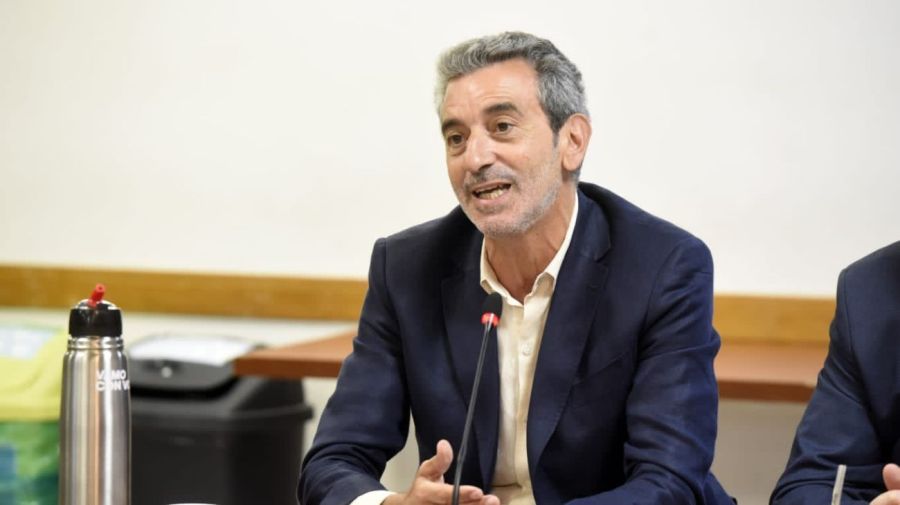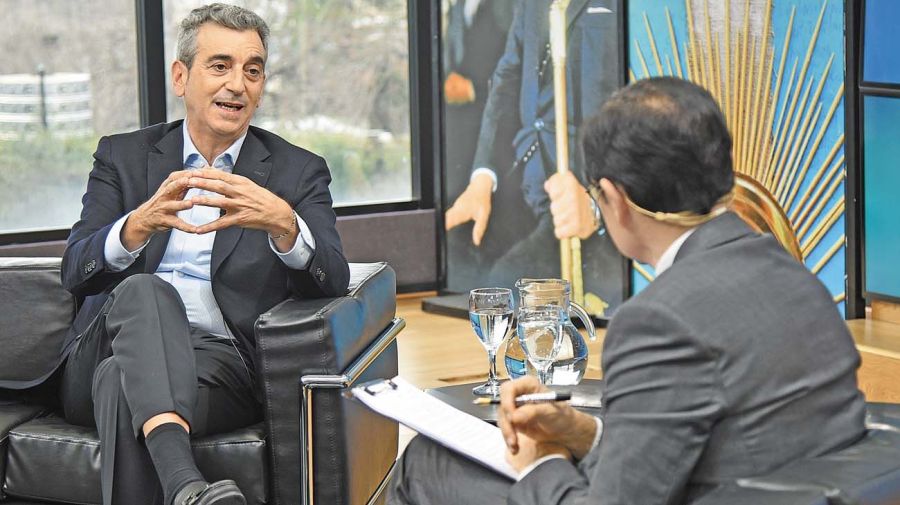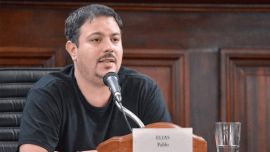Florencio Randazzo, 59, served as interior minister for eight years under former president Cristina Fernández de Kirchner, and once enlisted Alberto Fernández as his campaign chief. He is now so annoyed with both of them that he would prefer Javier Milei to triumph in the elections over Sergio Massa. The emotion and anger emerging from this interview perhaps reflects many Peronists today who have crossed the breach to vote for Milei.
Randazzo is now Juan Schiaretti’s running-mate for Hacemos por Nuestra País and he proposes the Córdoba model over Kirchnerite Peronism. Tempted by the two main coalitions, both before and after the PASO primaries, as part of bids to gain political muscle and reach the run-off against Milei, Schiaretti and Randazzo prefer a solo path to the October 22 elections. Their political vision transcends this election and looks towards reinventing Peronism after a possible defeat at the ballot-box.
Some 12 million Argentines did not vote or cast blank ballots [in the August 13 primaries]. What does this symptom, which the political scientists call alienation, say to you?
Yes, it’s clearly a symptom that much of the population is at odds with politics, which has ceased to be a tool of transformation to improve people’s lives, increasingly so in the last two decades with the installation of the grieta rift deepening that. The grieta has ended up being good business for the two coalitions, Frente de Todos and Juntos por el Cambio, whose survival in power does not stem from improving people’s lives but from the electoral tension between one side and the other. And that, beyond any doubt, has distanced much of the political leadership from the problems worrying society at large, rotating in an entirely different orbit. And that, in turn, has led to an attitude on the part of much of society of not finding via electoral participation any possible route towards solving its problems.
Has the grieta ended up devouring those promoting it?
Totally, there can be no doubt about that. I’ve been insisting for some years that we must put a stop to the grieta. [Mauricio] Macri had a great opportunity in 2015 and it’s clear that I have nothing in common with him but he did have a big chance to start taking another path, one which I believe society to be demanding. We have a political leadership anchored in the past which does not discuss problems of the present and future. It would seem that they have no answers there. And Macri, instead of moving past the grieta in a quest for answers to the problems Argentina then had, linked to an [annual] inflation already topping 20 percent, major levels of poverty and the lack of a state presence in essential public services, deepened the grieta in a battle with his opposite number Cristina Fernández de Kirchner and that helped him to win in 2017. I remember being a senatorial candidate in 2017 and I was already saying then that we had to get out of the grieta, which only made the problems more acute. And Macri did not take advantage of that triumph, which somehow could have marked the end of one political phase and the start of another, to answer the true demands of society, but instead deepened the grieta.
Earlier this month a controversy arose with the ruling party of Buenos Aires Province when Governor Axel Kicillof said that Peronism had to learn how to play some new songs, to which Máximo Kirchner responded saying that he was no musician while [Quilmes Mayor] Mayra Mendoza called it disrespect towards Kirchnerism. Does Peronism need to play some new tunes and reinvent itself?
I have no doubt that Peronism is not represented today by Kirchnerism, which has shrunk as time goes by. When Kirchnerism triumphed with Néstor Kirchner in 2002 [sic, 2003], he represented more than Peronism, a claim which, I always insist, stands up to backchecking. In the midst of Kirchnerism I said that he was a Peronist and the Kirchnerites did not like that very much. I explained that Kirchnerism was more than Peronism because Kirchner had interpreted the social fabric of the crisis of 2001, bringing in the social organisations and other political parties. Indeed the peak expression of that policy was in 2007 with the incorporation of [UCR vice-president Julio] Cobos. Now that has gone off the rails, beginning a destructive process of that outlook of a broad, all-embracing front which also signified the possibility of carrying out an important transformation in Argentina, which needed a lot of political support. That process began to crumble as from [Néstor] Kirchner’s death, that’s the feeling I have.
After analysing this for a long time, it seems to me that Cristina ended up taking refuge in the youngsters of La Cámpora, who have some very wrong-headed ideas, according to my criteria. Firstly, they have no idea where the world is heading. The world has its ground rules and we have a representative democracy and live in a market economy where we do not set the rules and laws, whether we like it or not. Also we are looking for an efficient state but they have no idea of the importance of administrative or managerial skills. And I believe that they have derailed the process of expanding the political system into having both more depth and more breadth to go ahead with transformations.
I’m convinced that Peronism has ceased to be represented by Kirchnerism. I find it very hard to understand how many Peronist leaders can feel no shame over belonging to a government with 200 percent inflation in an Argentina which has 20 million people or 40 percent of the population below the poverty line. A government which has abandoned any policy which might create wealth, investment and jobs which is the only way possible to come out of poverty – there is no other path.

Córdoba is the most anti-Kirchnerite province and that is one of the problems facing Sergio Massa, who at one point was allied with [late governor José Manuel] de la Sota, because he is now perceived as part of Kirchnerism. You were Cristina’s minister for eight years and yet are not considered in that way, why?
Firstly, I always engaged in dialogue with all the governors, including De la Sota and Schiaretti, with my main concern within the government always being governance as what seems to me the best way of honouring politics, which has to serve to solve people’s problems or else it’s no use. So I came away with much capital being able to tell the world what I did and there is major recognition for that: the identity documents, the passports, the SUBE public transport cards, the trains, the Highway Board, etc. That’s what politics should be all about and there is great recognition, over and above the question-marks which surely exist as to whether people vote or not for such things. In principle it would appear not, with the motivations to vote being more emotional than rational, but I have maintained a line of conduct, I’m one of those men who believe that Argentina and its politics have lost its values, the value of keeping one’s word, of solidarity, of empathy, of belonging to a group. I walked out in 2015, feeling myself distanced by Cristina’s decisions. As I understood it, we lost a grand opportunity in 2011 when Cristina won with 54 percent of the vote. She should have kept her promises, which were fine-tuning, a new federal tax law, a Judiciary with greater controls to be measured by its results, contributing to the modernisation of both the judicial system and the electoral system. And yet none of that moved ahead – instead her intention of delegating, as she continues to do today, became clear.
Since administrative work does not seem to be appreciated either at presidential level or by the voters, do you think that the centre is also a very uncomfortable place from the electoral standpoint?
I don’t like labels like left, right and centre much. I believe in political decisions being rational and pragmatic. I’m pragmatic myself and then, of course, it depends on what ideas we have of the state and what degree of intervention we allow it. And there two extremes appear, we might say those who do not believe in the state at all and those who believe in an omnipotent market with the latter perhaps represented by Juntos por el Cambio, and those who believe in an omnipotent state to be measured by the intensity of its regulations and the sums of money it spends. I don’t believe in either, I believe in a smart state.
And that would be [your ticket] Hacemos por Nuestro País.
Exactly.
Or in other words, that famous definition of “as much market as possible and as much state as necessary” divides the two coalitions.
Exactly.
Now where would you place Milei there?
Milei...
No state at all.
Exactly. He approximates the idea of not having a state and I don’t believe in that. I believe the state to be fundamental, firstly, to provide essential services, then to have equitable tax policies and then to create interesting distribution policies.
With Milei casting Juntos por el Cambio aside as a “second brand,” in his words, in his political map, where do you stand in that dichotomy between state and market?
Exactly, Patricia Bullrich clearly had a serious problem there, that’s why the impact of the [PASO primary] election was very harsh. Not to mention for the government, which finished third, whereas in Cambiemos, while Patricia beat Horacio Rodríguez Larreta in the PASO, she was wrongfooted by the new emerging national scenario because it really is as Milei said: “I’m Coca-Cola, Patricia is Manaos.” That seems interesting to me because he has come to represent precisely many of the things which Cambiemos had been proposing.
In this quest to find the right mix of state and market according to the German Social Democratic prescription, three persons in the last 15 years have converged and then drifted apart: yourself, Sergio Massa and Alberto Fernández. Alberto Fernández was the campaign chief for both you and Sergio Massa while the latter competed with you and was on the point of teaming up, even with Schiaretti more recently in 2018. Alberto as president in 2019 and then in 2022. How do you explain being so distant today from people who are themselves distant from these two extremes?
But Massa and Alberto, and I say this with respect, as [Juan Domingo] Perón put it: “They talk a lot about their ideas, only a little of things and nothing about people.” They are very lax in their convictions. They do have one virtue, if you can call opportunism a virtue, but it’s not mine.
Let’s see if I can explain it another way, you’re always in the centre while their centre consists of averaging out between one side and the other.
I’m where I’ve always been, maintaining my conduct even when receiving some very important offers because I do not believe that politics is about a career and posts. I’m a man of convictions who defends what I think and believe.

I repeat, one thing is being in the middle and another thing is averaging out between two extremes. Would that be your explanation?
I basically bet on a normal country where those who steal go to jail, those who do not study have to repeat classes and those who do not work do not earn wages. Here some essential things have been lost in Argentina. A representative democracy, a market economy and an efficient state are needed in Argentina. If that’s being the centre, it should be welcomed. And what makes Schiaretti and myself different from the rest of the candidates is what we have done, he in his province and I in those posts where I had administrative responsibilities. Opportunism differentiates me from Massa and Alberto because I’m not an opportunist. They have surely done better out of it, in their vision perhaps but not in mine. I believe in and sustain my ideas and I believe that someday, sooner or later, Argentina will adopt a more rational course because the results have really been very bad, the abandonment of values on the part of politicians, the loss of value of the word once given, the loss of commitment, all this has destroyed politics.
Beyond your wishes, there is a very possible scenario of Hacemos por Nuestro País not making it into the run-off. If there is a run-off between any of the other three competitors, what would you do?
We have the greatest expectations for October 22. We invite those who are going to vote to reflect on the five tickets remaining out of the 22 [after the PASO]. I haven’t the slightest doubt, and I say that with total humility, that the best presidential candidate is Schiaretti, for his track record, for being a successful governor in a complex, productive and interesting province where there is industry, agriculture, cattle-rearing and tourism with respect for the institutions, which is linked to giving confidence and predictable conditions to those who come to invest. In that respect Córdoba has been exemplary, it has an efficient state which provides services and an economy without deficit which has permitted the investment of US$8 billion in the province in the last few years, as I was telling you. He has a complementary outlook to the scientific sector, the productive sector and the state. So if society could take the time to reflect on the different candidates, there can be no doubt who is best. And he believes in administration, as I do. There is no better way of transforming reality than managerial administration. So we are betting on doing well on October 22 and then we’ll see. But in any case any votes we might garner, neither the million we have already won nor any we might obtain, do not belong to us. We cannot tell people for whom to vote, it remains to be seen afterwards if there is a run-off.
But what is your position in particular?
I have none.
Not even a candidate for whom you would not vote under any circumstance?
It is quite clear that we do not feel identified with any of the candidates.
But you do not see any as “the evil one.”
No, I respect the citizens going to the polling-booth, both when they accompany us and when they don’t.
Do you imagine that a government presided by Javier Milei could be viable?
Maybe. Why not?
So help me to understand, with a handful of deputies and an even smaller handful of senators, how do you govern?
You don’t need much to be better than this government, you need common sense. Here they want to impose scare tactics and that’s irritating because it justifies the failure of politics. They should ask why people are voting for Milei, it is because the failure of the traditional political leadership has brought Argentina to failure. Argentina is a country where everything remains to be done with thousands of opportunities. Argentina does not need to invent anything, it only has to copy but nothing of that has been done. All the problems have become more acute. The most emblematic case is having the economy minister as a presidential candidate when he is the man responsible in the past year for two million more people falling below the poverty line with the most important inflation in the last 32 years of [almost] 200 percent. And the idea that nothing can be resolved is false, that is something which makes me violently passionate. We cannot give up, it is possible for Argentina to resolve inflation, it is possible for Argentina to have a productive policy, it is possible for Argentina to develop, it is possible for Argentina to reconstruct a state which provides quality services, how is that not going to be possible?
You said that you do not need much more than common sense, do you think that Milei has common sense?
I’m not the one to speak of Milei. He is the choice of seven million Argentines so you have to wonder what the politicians must have done for this phenomenon to occur, independently of Milei. If Milei is so awful, you should ask the politicians what happened for something so bad to win because if not, we’re not taking responsibility for anything.
If Schiaretti does not win, would you prefer Milei to win?
I’d prefer people to vote free from fear because that does not seem to me to be good for Argentina. It is clear that Patricia Bullrich was part of a government which failed and Massa is the visible face of Kirchnerite failure. That’s why now that the people have placed their bets on coming out of the grieta, they should do so with Schiaretti, not Milei, that seems much more reasonable to me.
You have already told me of your belief that Kirchnerism was decadent. Do you see that same decay in Macri and Juntos por el Cambio?
I have no doubt about that. A new political configuration is arriving in Argentina, above all, if Milei triumphs. There will be new coalitions which could include the idea of constructing a more rational centrist grouping arising out of the two extremes, Kirchnerism and that perhaps expressed by Milei. And there lies a great opportunity for more rational people with a common vision of what Argentina should be.
If Milei wins, there would be a reconfiguration with two coalitions with the appearance of a sector representing something different from him, moderate and centrist; if Sergio Massa wins, only Juntos por el Cambio would reshape.
The government has no chance. Voting for it would mean ratifying its course.
So the worst election would be the one won by Sergio Massa.
I don’t know if it would be the worst, I just don’t think that the government has any possibility of winning.
Therein lies the Milei phenomenon, that people like you, absolutely Peronist, are so angry with the current Peronist representation that they would prefer Milei to them.
I’m ashamed of this government, which speaks in the name of Peronism and defends 20 million people sunk in poverty with 200 percent inflation and a shopping-basket which does not suffice. They have created a new category of poverty where having a job does not fill the basic shopping-basket. They make me feel indignant, not Milei or Cambiemos, because I have nothing to do with them, they do not claim to represent me nor speak in my name.
Production: Melody Acosta Rizza & Sol Bacigalupo

























Comments